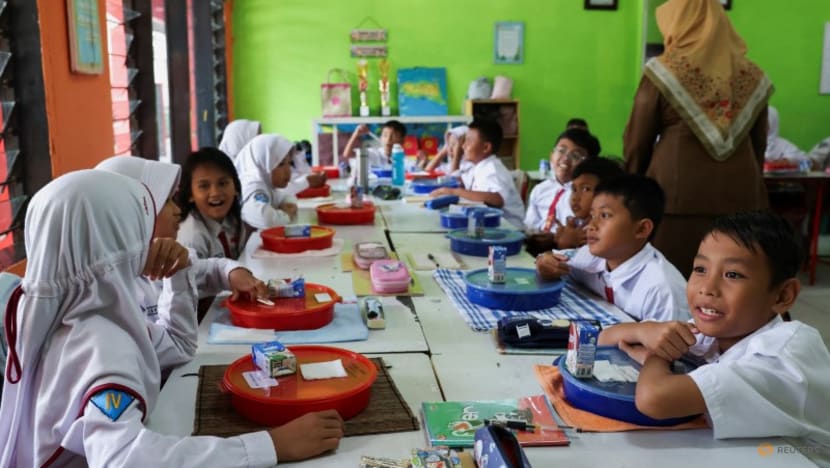JAKARTA: Ahead of its official roll-out next Monday (Jan 6), Indonesia’s free meal programme for children and pregnant women has stirred some confusion among parents whether they have to pay.
The scheme has also been allegedly used by scammers to fleece dozens of business owners.
The latest hiccups have prompted officials overseeing the programme to urge the public to be vigilant against scams, and clarify that meal recipients will not foot any costs.
Last week, catering businesses in the Kediri regency in East Java apparently fell victim to fraud and were cheated of over 72 million rupiah (US$4,440), the Jakarta Globe reported.
The small business owners were reportedly offered the opportunity to become vendors of the free meal initiative in the area, and were told to make deposits of 1 million rupiah for every 1,000 meals they could provide.
A community group called Manunggal Cipro Roso Kuliner had claimed to be preparing a tender for the meal programme and collected deposits from 43 catering businesses, reported Jakarta Globe. The business owners are demanding that their money be returned.
The Kediri authorities have distanced themselves from the scam, with Kediri District Military Commander Ragil Jaka Utama saying his institution was not involved in the programme.
The National Nutrition Agency has warned the public about fraudulent schemes exploiting its programme’s name. It clarified it does not charge fees or offer paid collaborations related to the initiative.
“We deeply regret the incident,” the agency’s spokesperson Lalu Muhammad Iwan Mahardan said.
“We urge the public to remain vigilant. The National Nutrition Agency provides all its services free of charge,” Lalu said, advising the public to report any suspicious activities.

A flagship election campaign promise by President Prabowo Subianto, the free meal programme aims to feed 82 million children, primary and secondary school students as well as pregnant women to address malnutrition in the country.
The first phase of the programme is set to run from January to March and aims to benefit three million recipients. The second phase, from April to June, will target six million recipients. The overall goal is to reach 15 to 17 million people by the end of the year, and its target 82 million recipients by 2029.
In recent months, trial runs have been conducted at over 100 locations across Indonesia, mainly on the island of Java.
BUY TWO LUNCHBOXES TO EAT FOOD? NO NEED, SAYS AGENCY
Another recent controversy arose from a viral video last month of a parent claiming that an unnamed school wanted extra payment for the lunchboxes.
“The meals are free but you must buy two lunchboxes to eat the food, each one costs 30,000 rupiah (US$1.85), so buying two means you spend 60,000 rupiah per child,” TikTok user @ahmad.lehan6 said in a caption for the clip, which showed what appeared to be a meeting at a school.
The video, posted on Dec 18, has since garnered over 3.5 million views and drawn many comments.
News outlet Tempo reported that one of the comments was from the official TikTok account of Prabowo’s Gerindra party, which asked who provided the information that the meal programme required payment for lunchboxes.
The TikTok user @ahmad.lehan6 replied: “The principal.”
The National Nutrition Agency denied the allegations and maintained the programme is free for recipients.
“The nutritious meal programme is here to make sure that every Indonesian child has access to the nutrition they need for their growth, there should be no levies let alone extra costs for a lunchbox,” the agency’s Lalu said, as quoted by Tempo.
Lalu also asked the public to make a report if they encounter any illegal levy attempt related to the free meal initiative.
“The free meal programme is here to alleviate the parents’ burden, not the other way round,” he said.
The cost and logistics of the free meal programme have been in the spotlight since Prabowo’s election victory in February 2024.
Some 71 trillion rupiah has been allocated for the programme for 2025. In late November last year, the government said it would cut the budget for each meal from 15,000 rupiah to 10,000 rupiah due to fiscal constraints.
Experts have also said logistics will be one of the programme’s biggest challenges due to the cost and challenges of distributing perishable food to the outer islands and remote parts of Indonesia.
The National Nutrition Agency plans to source ingredients from local farmers and livestock producers, and said last week that in areas where cattle are rare, some students would receive moringa leaves for their calcium intake instead.
